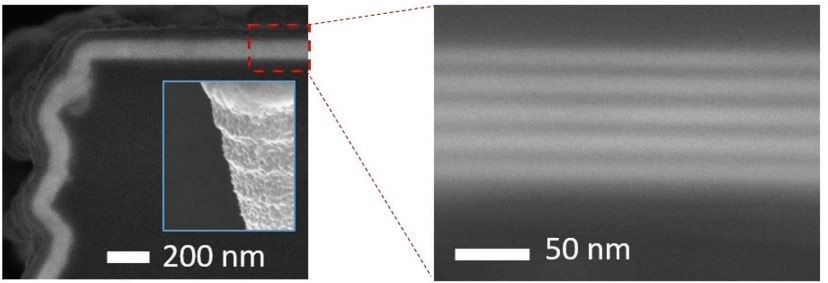Picosun Group, a leading, global supplier of ALD (Atomic Layer Deposition) thin film coating solutions, has developed a groundbreaking method for biocompatible encapsulation of microelectronic body implants.
 Figure: SEM images showing conformal ALD nano-laminate on edges and corners of test Si pieces(*).
Figure: SEM images showing conformal ALD nano-laminate on edges and corners of test Si pieces(*).
Remote sensing and therapeutics through self-powered, wirelessly operating microimplants is an emerging technology that is finding a plethora of uses throughout the medical field. Some key examples are neural stimulation and diagnostics, blood glucose, blood pressure, intraocular and intracranial pressure measurements, and even artificial eyesight. These minuscule devices are typically implanted for extended periods of time (from several months to well over ten years), so encapsulation of their sensitive electronics against the corrosive environment inside the human body is crucial. Naturally, also the body has to be protected against possible inflammatory or rejection reaction caused by the implant. Traditional encapsulation materials, mostly used for macroscopic objects such as pacemakers or Cochlear devices, include titanium metal, ceramics, and several polymers such as parylene or polyimide. However, when the implant size diminishes, and the requirements for the implant lifetime increase, novel encapsulation methods and materials are called for.
ALD is an ideal method for reliable, hermetic encapsulation of various implantable devices, from micro-scale sensors to more macroscopic items such as hip, knee, and dental implants. Several ALD materials are intrinsically biocompatible and inert in the human body. ALD method produces ultra-high quality thin films, that cover uniformly and conformally even complex 3D-structures with nanoscale details, thus the desired effect of the coating can be achieved with much thinner material layers compared to the traditional methods. ALD coatings can be applied at relatively low temperatures, which advocates their use also on sensitive materials such as plastics and polymers.
Picosun has now developed an ALD nanolaminate encapsulant that can potentially ensure microimplant lifetime of over 10 years in human body environment(*). The nanolaminate deposition process is readily scalable to high throughput, cost-efficient industrial production of hundreds or even thousands of implants per run in PICOSUN™ P-300B or P-1000 ultra-large batch ALD reactors.
There is an increasing number of customers in the healthcare industries that are now looking at ALD to solve some critical issues in their products. We at Picosun have developed a whole family of production-proven, turn-key PicoMEDICAL™ solutions specifically to answer this need. The excellent results of our ALD encapsulation for biomedical microimplants prove that our technological knowhow and decades of experience in the field are now paving the way for a whole new generation of ALD-enabled healthcare solutions.
Dr. Jani Kivioja, CTO of Picosun Group.
(*) J. Jeong, F. Laiwalla, J. Lee, R. Ritasalo, M. Pudas, L. Larson, V. Leung, and A. Nurmikko: Conformal Hermetic Sealing of Wireless Microelectronic Implantable Chiplets by Multilayered Atomic Layer Deposition (ALD), Adv. Funct. Mater. 2018, 1806440. DOI: 10.1002/adfm.201806440.